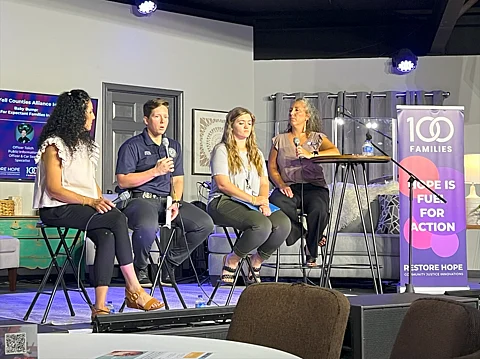
- Home
- Topic Areas
- Newsletter
- Podcast
- 100 Families Initiative
- About
- Connect
- Restore Hope

At the 100 Families Alliance meeting in Pope County, local leaders came together to address the needs of expectant families lacking access to prenatal care, car seat safety, and support services.
Attendees included staff from Choices Care, the Russellville Police Department, Arkansas Department of Health, judicial and social services, and more.
Tiffany Beaudry facilitated the meeting as the coordinator for the 100 Families Initiative in Pope and Yell Counties.
“We’re walking with the participants," she explains to the community members gathered. "Really what we do is reach out to you in the community and your resources...and then build a support team. So this is what Hope looks like.”
Panelists discussed the practical barriers many families face—language differences, transportation issues, lack of insurance, and long wait times to see an OB-GYN.
Hailie Tolich from the Russellville Police Department introduced the police department’s newly revived car seat program, which aims to reduce injuries and save lives by helping families properly install child seats. The department has a few certified technicians and plans to expand training soon.
Christy Renfroe, executive director of Choices Care shared how her team helps mothers navigate gaps in insurance coverage and prenatal care, often stepping in with creative solutions. She acknowledged the difficulty mothers face when they can’t afford a car seat, especially since they can’t accept used donations due to safety standards.
Allie Bell from the Arkansas Department of Health spoke about the wide range of public health programs available, emphasizing that income is no longer a major barrier for many families thanks to updated guidelines. Their office provides support without requiring proof of pregnancy and offers streamlined services with minimal documentation.
Here’s a more emotional and human-centered version of that section:
When it comes to reaching families in need, the panelists shared stories that underscored just how far they’re willing to go to make sure no one falls through the cracks.
Hailie spoke about how something as simple as a Google form can open the door to safety—giving families a lifeline through car seat appointments. Whether it’s a group training or a one-on-one session, the department is ready to meet families where they are, no matter the size of the need.
Christy described the heart behind Choices Care’s open-door policy. For mothers facing crisis pregnancies, just walking in the door can be an act of courage. That’s why they offer confidential communication options and meet clients on their own terms—with parenting classes built around each woman’s life, not the other way around.
Allie shared her gratitude for the bilingual staff and translation services that make it possible for families who speak Spanish or use American Sign Language to be fully seen and heard. In moments that are already overwhelming, that kind of inclusive care can be the difference between isolation and hope.
Transportation remains a persistent barrier. The health department has limited capacity to assist with travel, though they are becoming more flexible through remote work certifications. Christy shared that their clinic sometimes relies on trusted volunteers to help get women to appointments—even using Uber when needed. Halie offered to bring car seat checks directly to larger groups or events.
In emergencies, the community often steps up. Christy said local donors are sometimes able to fund the purchase of a car seat when one is urgently needed, and storage space is the only limiting factor. Halie added that the police department is preparing to host a new car seat certification class open to both officers and civilians, made possible through grants and partnerships with Arkansas Children’s Hospital.
Allie highlighted additional health department resources, including free Tdap vaccines for adults around newborns, a mobile app called Pregnancy Plus with educational videos and local services, and materials to help mothers track baby movements and share updates electronically.
“One year ago, we didn’t have this. Now we’re sitting in a room full of people who aren’t just talking—they’re doing the work.”
Those words from Tiffany Beaudry captured the heart of the 100 Families Alliance meeting in Pope County. What was once an idea has become a movement—one built on trust, shared responsibility, and a deep commitment to families in crisis.
Smart Justice is a magazine, podcast, and continuing news coverage from the nonprofit Restore Hope and covers the pursuit of better outcomes on justice system-related issues, such as child welfare, incarceration, and juvenile justice. Our coverage is solutions-oriented, focusing on the innovative ways in which communities are solving issues and the lessons that have been learned as a result of successes and challenges.
The podcast is available on all major podcasting platforms.
Subscribe to the Smart Justice newsletter.
